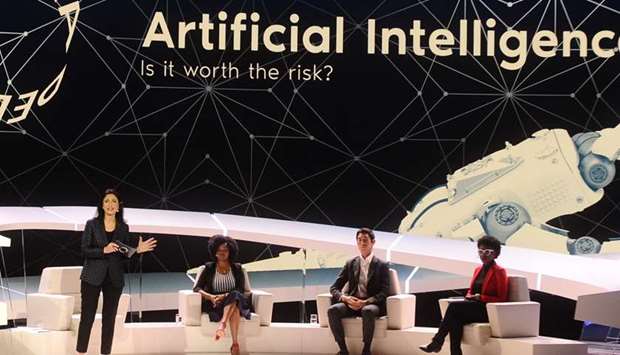Most participants who took part in an online voting yesterday at the debate on ‘Artificial Intelligence (AI): Is it worth the risk?’ conducted by Doha Debates, voted ‘demand a say on how AI is used to shape your life’.
The second programme of Doha Debates, a Qatar Foundation initiative and re-launched in a new format with livestreaming, took place at Northwestern University in Qatar.
The event discussed the benefits as well as the challenges of AI with some of the leading experts in the field in attendance. It was followed by a Majlis-like discussion where the audience could interact with the panellists.
A total of 48.63% of the participants in the voting felt that people should have a say how AI is used to shape their lives while 31.69% voted for government leaders who understand technology. About 15.85% felt that people should learn to code while the rest of the voters noted the need to learn how AlphaGo works.
The session started with the presenter of the show, Ghida Fakhry, introducing the topic and encouraging the panellists and participants to come out with the pros and cons of the AI.
The panellists at the debate were Joy Buolamwini, a Ghanaian-American computer scientist and digital activist at the MIT Media Lab of Massachusetts Institute of Technology; Dex Torricke-Barton, a former communications executive at Facebook, Google and SpaceX, and a British bestselling author; Muthoni Wanyoike, a Kenyan data scientist and organiser at Code for Africa and Nairobi Women in Machine Learning & Data Science.
The other panellist, Nick Bostrom, a Swedish philosopher, bestselling author, and director of the University of Oxford’s Future of Humanity Institute, joined the session through teleconference from London. Govinda Clayton, a conflict-resolution expert and researcher at Swiss Science and Technology University ETH Zurich, played the role of the debate’s bridge-building ‘connector’.
Opening the debate, Wanyoike noted how AI is used for various purposes and in the sub-Saharan context arguing that AI will create more equality among nations.
“Elephants are mercilessly hunted in many sub-Saharan countries. Now AI is used to protect them through many AI-enabled tracking systems. AI is accelerating growth in several areas and by following customer behaviour and customer practices, AI is enabling the youth in African countries for greater economic changes,” Wanyoike said.
Buolamwini highlighted that without oversight, AI will amplify inequality.
“The system can be used for very harmful purposes and in future if a person is not recognised by AI, it could have many negative implications. There must be regulations for AI that respect human values and rights,” she highlighted.
Bostrom felt that there are two aspects of AI: the near term and the long term context. “In the near term, it will make systems more efficient. It will develop better healthcare facilities and self-driving cars and many more. In the long term, it will open several wonderful opportunities with significant risks, including existential risks. There should be scalable methods to control AI,” pointed out the expert.
Torricke-Barton noted that AI is still in its infancy and most people in the present world are already making use of Al in one way or another. “When we are using a smart phone we are using AI. AI is the most powerful tool that the world has seen so far. It can be used for good as well as evil purposes. Politicians and policy makers have to understand it better and provide the necessary frameworks,” added the panellist.

Presenter Ghida Fakhry with three panellists. PICTURES: Shemeer Rasheed

